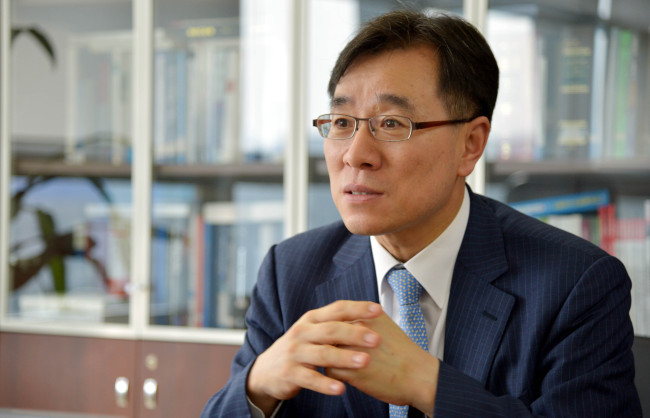This is the sixth and last installment in a series of articles delving into cybersecurity challenges facing South Korea and the world, and global efforts to tide them over. ― Ed.
In cyberwarfare, neither the rumblings of tanks nor the crackle of gunfire can be heard. But there are elite forces grappling to ward off attacks in cyberspace and preserve the computer networks that are crucial for people’s everyday lives.
For South Korea, nurturing cyberspecialists has become a critical national task as Pyongyang’s cyberthreats intensify. Korea University has undertaken the task of raising military officers armed with computer skills, policy insight and legal knowledge, not to mention patriotism.
“The purpose of this department is to educate cadets who will be the buttress of the country’s cybersecurity. Thus, we are trying our utmost to pick top-notch students and produce skilled, responsible and patriotic cybersecurity experts,” Lim Jong-in, chief professor of Korea University’s Department of Cyberdefense, told The Korea Herald.
In cyberwarfare, neither the rumblings of tanks nor the crackle of gunfire can be heard. But there are elite forces grappling to ward off attacks in cyberspace and preserve the computer networks that are crucial for people’s everyday lives.
For South Korea, nurturing cyberspecialists has become a critical national task as Pyongyang’s cyberthreats intensify. Korea University has undertaken the task of raising military officers armed with computer skills, policy insight and legal knowledge, not to mention patriotism.
“The purpose of this department is to educate cadets who will be the buttress of the country’s cybersecurity. Thus, we are trying our utmost to pick top-notch students and produce skilled, responsible and patriotic cybersecurity experts,” Lim Jong-in, chief professor of Korea University’s Department of Cyberdefense, told The Korea Herald.

The Ministry of National Defense signed an agreement with Korea University to open the Cyberdefense Department under the Division of Information Security in June 2011, some two months after the North mounted a massive cyberattack on the banking system of the National Agricultural Cooperative Federation.
Under the agreement, students receive a full scholarship for the four-year program and a monthly “study incentive” of 500,000 won ($483). Upon graduation, they are to be commissioned as second lieutenants and must serve in the military for seven years. In 2016, the department will graduate 30 students for the first time.
Lim said that his school has been a trailblazer in building an educational platform to raise cyberwarriors as the school’s cyberdefense program is the world’s first university-level initiative, which many countries would like to emulate.
“This department is the world’s first platform ― a reason why many experts around the world have paid attention to it,” said Lim. “As the cyberthreats become more and more complicated and continue unabated, we have been aiming to carve out an effective, sustainable educational model.”
The curriculum runs the gamut of cybersecurity studies including cryptology, cyberlaw, cyberpsychology, cyberstrategy, hacking, evidence collection, digital forensics and basic military studies. The school also embedded some programs in the curriculum to inculcate students with patriotism and a strong work ethic.
“What we regard as very important is to instill patriotism into aspiring cyberexperts given that they would become high-level cybersecurity officers or policymakers. Students, thus, need to develop patriotism and balanced security perspectives,” said Lim.
Aware of the government’s high expectations, students feel a sense of responsibility as well as pride.
“My mother calls me a son of the nation as I will become a commissioned officer in charge of cyberdefense upon graduation,” said Kang Min-ho, one of the 30 sophomore students. “As I learn about cybersecurity here, I feel that I have a greater sense of responsibility and integrity as we will handle national security issues.”
Kang added that the advantage of majoring in cyberdefense is that there is “no time to get bored.”
“Our department deals with a wide spectrum of cybersecurity studies including information, security, law, physics, computer science, government policies, etc. So you can focus more on where your interest lies and you never get bored,” he said.
Jeong Su-ji, another sophomore student, said that she was excited about her future role in enhancing the nation’s cybersecurity.
“There are still cybersecurity systems that South Korea lacks. And the world is in the process of establishing a new order for the new security domain,” she said. “Against this backdrop, my hope is that I could contribute to improving South Korea’s cybersecurity, which would also have some economic ripple effects.”
By Song Sang-ho (sshluck@heraldcorp.com)
-
Articles by Korea Herald










![[Kim Seong-kon] Democracy and the future of South Korea](http://res.heraldm.com/phpwas/restmb_idxmake.php?idx=644&simg=/content/image/2024/04/16/20240416050802_0.jpg&u=)








![[Today’s K-pop] BTS pop-up event to come to Seoul](http://res.heraldm.com/phpwas/restmb_idxmake.php?idx=642&simg=/content/image/2024/04/17/20240417050734_0.jpg&u=)